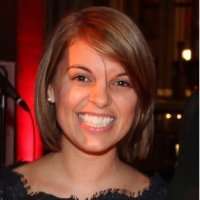As you round the corner of Prince Consort Road, you raise your head to catch a glimpse of the tip of the Royal Albert Hall dome. But just as you do…SMACK! You’ve collided with a stranger’s back. Reorienting yourself you realise there’s a queue a mile long, winding down the steps outside the Royal Albert Hall and stretching all the way to bus stop down the road. I was warned about this: every summer, Londoners come out in swarms to see if they can snag a £5 standing-room only ticket to London’s annual classical music festival, BBC Proms. A tradition that has been coined Promming, Friday night’s line included families, businessmen, students, even frantic press officers interviewing people with bright yellow Flip cameras. The excitement in the line alone set the tone for the evening.
Once inside, the majesty of the Royal Albert Hall was enough to make you catch your breath. And the world première of Judith Weir’s Stars, Night, Music and Light proved to be the perfect opener for the Proms. Despite the massive scale of the piece—which was written for chorus, orchestra and organ, all of the same performers involved in Leos Janáček’s Glagolitic Mass later that evening—the music itself was simple and refreshing. Towards the end of the short piece, the stage glittered like a night sky amidst a faint turquoise glow as the BBC Symphony Chorus repeatedly sang ‘Music and Light’.
Compared to the sheer size of Weir’s piece, Brahms’ Academic Festival Overture seemed, at first, a little subdued. But after a quick crescendo, the Overture turned cheerful and jubilant. Written as a gesture of thanks to the University of Breslau for awarding him an honorary doctorate in 1880, Brahms’ Academic Festival Overture was artful, humorous and fun.
Next up was Benjamin Grosvenor, the 19-year-old pianist who performed Franz Liszt’s Piano Concerto No. 2. Opening up with a deeply expressive melody, Grosvenor’s arpeggios played over the Orchestra’s undulating strings and created an ethereal texture, entrancing audience members right from the start. But unlike most concertos, this opening line was the last time the piano held the solo melody. One single long movement, this concerto is more like the symphonic poems Liszt is better known for. Arranged around thematic variations, Piano Concerto No. 2 had a visceral quality, one so intimate it felt like intruding upon a private conversation. Especially during the Allegro moderato section, as the piece nearly slowed to a stop, the cellist articulated the theme while the piano humbly accompanied. As Grosvenor played delicate trills over the eloquent cellist, you could feel the audience holding their breath, grasping for every last note. Transitioning seamlessly from colourful and elegant phrases to bold and brassy scherzos and marches, Grosvenor and the orchestra played masterfully throughout, capturing the schizophrenic nature of Liszt’s thematic metamorphosis.
Much to the audience’s delight, Grosvenor came back for an encore: Grosvenor dazzled the audience with one of Brahms's Hungarian dances arranged by Georges Cziffra, performed with technical brilliance and brazened flair.
Ending the night with Leos Janáček’s Glagolitic Mass, the soloists—Hibla Gerzmava (soprano), Dagmar Pecková (mezzo-soprano), Stefan Vinke (tenor) and Jan Martinik (bass)—alongside David Goode (organ), BBC Singers, and the BBC Symphony Chorus and Orchestra, delivered the oratorio with incredible energy and verve. An awesome, yet haunting piece, the Glagolitic Mass achieved what Janáček described as ‘noise and lightening flashes.’ With a violent climax at the end of the piece accompanied by thunderous choral voices, as well as David Goode’s furious organ solo, the whole piece felt dark, ominous and a bit maniacal.
Opening night of the BBC Proms is meant to be a bit of a fanfare. And performing Janáček’s Glagolitic Mass, alongside Liszt, Brahms and Weir, was a brilliant move. With the vocal force of the BBC Singers, Symphony Chorus and soloists, alongside the BBC Symphony Orchestra, led by Chief Conductor Jiří Bělohlávek, this first performance set the bar for the rest of the Proms.


